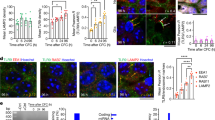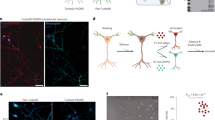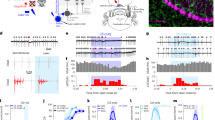Abstract
NEUROTRANSMISSION at most excitatory synapses in the brain operates through two types of glutamate receptor termed α-amino-3-hydroxy-5-methyl-4-isoxazolepropionate (AMP A) andN-methyl-D-aspartate (NMDA) receptors; these mediate the fast and slow components of excitatory postsynaptic potentials respectively1–3. Activation of NMDA receptors can also lead to a long-lasting modification in synaptic efficiency at glutamatergic synapses; this is exemplified in the CA1 region of the hippocampus, where NMDA receptors mediate the induction of long-term potentiation (LTP)4. It is believed that in this region LTP is maintained by a specific increase in the AMPA receptor-mediated component of synaptic transmission5,6. We now report, however, that a pharmacologically isolated NMDA receptor-mediated synaptic response can undergo robust, synapse-specific LTP. This finding has implications for neuropathologies such as epilepsy and neurodegeneration, in which excessive NMDA receptor activation has been implicated7. It adds fundamentally to theories of synaptic plasticity because NMDA receptor activation may, in addition to causing increased synaptic efficiency, directly alter the plasticity of synapses.
This is a preview of subscription content, access via your institution
Access options
Subscribe to this journal
Receive 51 print issues and online access
$199.00 per year
only $3.90 per issue
Buy this article
- Purchase on Springer Link
- Instant access to full article PDF
Prices may be subject to local taxes which are calculated during checkout
Similar content being viewed by others
References
Watkins, J. C. & Evans, R. H. A. Rev. Pharmaco. Toxicol. 21, 165–204 (1981).
Dale, N. & Roberts, A. J. Physiol., Lond. 363, 35–59 (1985).
Collingridge, G. L., Herron, C. E. & Lester, R. A. J. Physiol., Lond. 399, 283–300 (1988).
Collingridge, G. L., Kehl, S. J. & McLennan, H. J. Physiol., Lond. 334, 33–46 (1983).
Muller, D., Joly, M. & Lynch, G. Science 242, 1694–1697 (1988).
Kauer, J. A., Malenka, R. C. & Nicoll, R. A. Neuron 1, 911–917 (1988).
Meldrum, B. Clin. Sci. 68, 113–122 (1985).
Davies, C. H., Davies, S. N. & Collingridge, G. L. J. Physiol., Lond. 424, 513–531 (1990).
D'Angelo, E., Rossi, P. & Garthwaite, J. Nature 346, 467–470 (1990).
Hestrin, S., Nicoll, R. A., Perkel, D. J. & Sah, P. J. Physiol., Lond. 422, 203–225 (1990).
Randall, A. D., Schofield, J. G. & Collingridge, G. L. Neurosci. Lett. 114, 191–196 (1990).
Malinow, R. & Tsien, R. W. Nature 346, 177–180 (1990).
Dingledine, R., Hynes, M. A. & King, G. L. J. Physiol., Lond. 380, 175–189 (1986).
Coan, E. J., Irving, A. J. & Collingridge, G. L. Neurosci. Lett. 105, 205–210 (1989).
Nowak, L., Bregestovski, P., Ascher, P., Herbet, A. & Prochiantz, A. Nature 307, 462–465 (1984).
Mayer, M. L., Westbrook, G. L. & Guthrie, P. B. Nature 309, 261–263 (1984).
Bindman, L. J. & Murphy, K. P. S. J. J. Physiol., Lond. 406, 176P (1988).
Artola, A. & Singer, W. Eur. J. Neurosci. 2, 254–269 (1990).
Dolphin, A. C., Errington, M. L. & Bliss, T. V. P. Nature 297, 496–498 (1982).
Bliss, T. V. P. & Lynch, M. A. in Long-Term Potentiation: From Biophysics to Behavior (eds Landfield, P. W. & Deadwyler, S. A.) 3–72 (Liss, New York, 1988).
Davies, S. N., Lester, R. A., Reymann, K. G. & Collingridge, G. L. Nature 338, 500–503 (1989).
Bekkers, J. M. & Stevens, C. F., Nature 346, 724–729 (1990).
Leonard, J. P. & Kelso, S. R. Soc. Neurosci. Abstr. 15, 535 (1989).
MacDermott, A. B., Mayer, M. L., Westbrook, G. L., Smith, S. J. & Barker, J. L. Nature 321, 519–522 (1986).
Jahr, C. E. & Stevens, C. F. Nature 325, 522–525 (1987).
Ascher, P., & Nowak, L. J. Physiol., Lond. 399, 247–266 (1988).
Slater, N. T., Stelzer, A. & Galvan, M. Neurosci. Lett. 60, 25–31 (1985).
Stasheff, S. F., Anderson, W. W., Clark, S. & Wilson, W. A. Science 245, 648–651 (1989).
Scharfman, H. E. & Schwartzkroin, P. A. Science 246, 257–260 (1989).
Blanton, M. G., LoTurco, J. J. & Kreigstein, A. R. J. Neurosci. Meth. 30, 203–210 (1989).
Horn, R. & Marty, A. J. gen. Physiol. 92, 145–159 (1988).
Author information
Authors and Affiliations
Rights and permissions
About this article
Cite this article
Bashir, Z., Alford, S., Davies, S. et al. Long-term potentiation of NMDA receptor-mediated synaptic transmission in the hippocampus. Nature 349, 156–158 (1991). https://doi.org/10.1038/349156a0
Received:
Accepted:
Issue Date:
DOI: https://doi.org/10.1038/349156a0
This article is cited by
-
Higher Neuronal Facilitation and Potentiation with APOE4 Suppressed by Angiotensin II
Molecular Neurobiology (2024)
-
Myosin Va-dependent Transport of NMDA Receptors in Hippocampal Neurons
Neuroscience Bulletin (2024)
-
High levels of 27-hydroxycholesterol results in synaptic plasticity alterations in the hippocampus
Scientific Reports (2021)
-
Synapse loss and progress of Alzheimer’s disease -A network model
Scientific Reports (2019)
-
Inhibition of β-ARK1 Ameliorates Morphine-induced Tolerance and Hyperalgesia Via Modulating the Activity of Spinal NMDA Receptors
Molecular Neurobiology (2018)
Comments
By submitting a comment you agree to abide by our Terms and Community Guidelines. If you find something abusive or that does not comply with our terms or guidelines please flag it as inappropriate.



